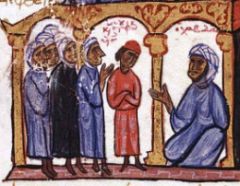130 - State of Mind: al-Fārābī on Religion and Politics
Al-Fārābī combines Islam and Greek sources to present the ideal ruler as a philosopher who is also a prophet.
Themes:
• C.E. Butterworth (trans.), Alfarabi: The Political Writings (Ithaca: 2001).
• T.-A. Druart (1996), “Al-Fārābī, Ethics and First Intelligibles,” Documenti e studi sulla tradizione filosofica medievale 7 (1996), 403-23.
• D.M. Dunlop, Al-Fārābī: Aphorisms of the Statesman (Cambridge: 1961).
• E. Gannagé et al. (eds), The Greek Strand in Islamic Political Thought, special issue of Mélanges de l’Université Saint-Joseph 62 (2004).
• J. Lameer, “The Philosopher and the Prophet: Greek Parallels to al-Fārābī’s Theory of Philosophy and Religion in the State,” Perspectives arabes et médiévales sur la tradition scientifique et philosophique grecque, ed. A. Hasnawi et al (Paris: 1997), 609-22.
• M. Mahdi, Alfarabi and the Foundations of Islamic Political Philosophy (Chicago: 2001).
• R. Walzer, Al-Fārābī on the Perfect State (Oxford: 1985).







Comments
Prophecy and imagination
Perhaps you'll deal with this next week, but if al-Farabi relegated kalam to second-class status, what means did he propose to determine the veracity of a ruler's claim to prophecy? The problem seems particularly difficult given that al-Farabi appears to conceive of prophecy and the imaginative faculty that receives it as nonpropositional, which would seem to leave its deliverances open to interpretation. I don't know much about religion, but isn't that a somewhat unusual view for an Abrahamic faith?
As for the quality of the intentions of contemporary politicians, there's no need for kalam there. Diogenes had it right: what is the enforcement of the law other than "the great thieves leading away the little thief"?
In reply to Prophecy and imagination by zwei_dinge
Determining the ruler's veracity
I think he would probably say that the ruler knows he is right since he has certainty (this is something that will be covered in the interview with Deborah Black), and that no one else is in a position to judge. That's why they have to be convinced/persuaded using rhetoric: because they can't assess truth claims on a demonstrative basis. In fact he doesn't really take up the question but this is, I think, what he would need to say given his theory. By the way I don't think that the imagination or prophecy need to be non-propositional; he is primarily thinking of the prophet as a user of rhetorical discourse. The point is not about propositionality, it is about whether he offers demonstration or just persuasion.
By contrast the question is discussed by others in the Islamic world e.g. the theologians themselves; they talk about the possibility that miracles are the proof by which prophets are acknowledged. That is accepted by some Ash'arites but Ghazali discusses it more critically in his autobiographical "Deliverer from Error" on which more in due course!
Peter
Philosophical history put in the context of modern philosophy
As someone who is not very familiar with philosophy it was nice to hear the mention of modern philosophy in this podcast. It seems to me that science has progressed exponentially over the last couple of hundred years, but I don't know if philosophy also has, or whether the same old topics are being debated. Perhaps in some of your podcasts you could consider putting some of the historical topics covered into the context of modern philosophical knowledge?
Also, I love this podcast. Thanks for doing this!
In reply to Philosophical history put in the context of modern philosophy by tommm
Contemporary point of view
Thanks very much! That point is one I think about a lot as I write the scripts, I mean, how often to introduce terminology and issues that are used in current philosophy. I am actually doing it pretty frequently though that may not always be obvious if you aren't steeped in contemporary philosophy. My aim is to try to make it clear how this stuff might be relevant to the contemporary debates without burdening the narrative with too much explanation about what is going on now; also there is the constant risk of anachronism. But I'd be interested to know whether people out there want to hear more (or less) in the way of allusions to contemporary philosophy.
By the way the interview with Deborah Black, which is the episode after this one, makes it pretty clear that the topic we're discussing relates to contemporary epistemology (for instance she alludes to reliabilism and the KK principle).
Peter
Mahdi vs. Walzer on the perfect state
I note that you list for further reading the books by Mahdi and Walzer. Mahdi wrote a review of Walzer's edition that was very critical--on Walzer's methodology, the text he compiled, and even on basic questions about Alfarabi's major beliefs. Do you have any opinions about their disagreements?
In reply to Mahdi vs. Walzer on the perfect state by Thornton
Mahdi v Walzer
Well I have a lot of respect for both of them but also some points of disagreement. Walzer is often criticized (this may be what Mahdi said too, I'm not sure) for assuming that Arabic philosophical texts are mostly useful for recovering lost Greek works; he has a tendency to reduce everything interesting in Arabic to some Greek source, even hypothetical lost sources. With Mahdi things are a bit more complicated but I think it would be fair to say he is in the Straussian tradition of reading Farabi, and you know what I think about Straussianism if you have listened to episode 161 on Maimonides. (And actually I find this approach less fruitful and textually supported for Farabi than for Maimonides.) I should hasten to reiterate though that both of them were wonderful scholars and did a lot to promote the subject, for instance with valuable editions and translations.
Farabi and plato's phil king
can you expand on the problems of moving from plato's view of poetry and similar things to farabi on the prophet-philosopher-king
In reply to Farabi and plato's phil king by aew
Plato to Farabi
This is a controversial issue in part because there is no agreement about what, exactly, Farabi was able to read. But probably a paraphrase version of Plato's "Republic" (also of the "Laws"), which may or may not have told him much about the critique of poetry. In any case when it comes to the use of various types of discourse in the political sphere he seems more interested in the rhetoric-dialectic-demonstration contrast which is of course Aristotelian, not Platonic.
One place to look though for more of his ideas would be his Great Book of Music, soon being translated into English I believe. In that he talks about the relationship between music and poetry, much as Plato does in the Republic, but it is a pretty standard association (I mean, poetry was often set to music in Arabic culture too) so one shouldn't leap to any conclusions. Cf. my recent rule 1 in the blog posts on methodology...
City?
As you noted, his politics talked about cities even though he lived in an extensive empire. How does he see his philosophy would work? Were cities tend to be very autonomous in the Abbasid empire at that time?
In reply to City? by Hoom
Cities
Yes, it's odd that he still thinks of cities rather than larger political blocks - this is often seen as a holdover from his sources, since Aristotle and Plato think about cities. So you could argue this is a failure on al-Farabi's part to see that his sources no longer address the situation "on the ground" so to speak. But in his defense, actually by this period the Abbasid empire has greatly weakened its grip on local authorities, so it may actually make sense for him to think of rulers as the leaders of city-sized polities, like for instance Aleppo or whatever.
Two Quick Comments
In responce to your responce to tommm, i think you have been doing a good job balancing out adding terminology when it is beneficial with enough explanation as well as talking about how it is relevant to today without devolving it into just a comment on today. I'd prefer no change to the status quo in that regard.
In responce to Hoom on the cities, Mesopotamia also has a long history of city states as a primary functional unit even within large empires, dating back to the early first millenia BC, so that might have fed into al Farabi's view of the ideal city (and it also tends to be a good sized political unit to talk about in modern times, since mayors now can focus on both narrow issues and big ideas in a way politicians higher up and smaller zoning boards often can't)
Prophet-Philosopher or Philosopher-Imam
Thank you for these podcasts. This is a great service to humanity.
Al Farabi's concept of Prophet philosopher seems very close to shia concept of Imam. Could it be that he really meant to say that the ideal ruler is a living Imam? May be he could not say it openly as he lived among the majority Sunnis in the Abbasid caliphate and fear possible repercussions? Thanks.
In reply to Prophet-Philosopher or Philosopher-Imam by Ali Amir
The shiite Farabi?
Yes, actually that is a pretty frequent suggestion in the literature; maybe not that he was a fullblown closet Shiite but that he had 'Alid sympathies, like many Sunnis at that period did. For what it's worth I am not so impressed by that thought: I think the prophet-philosopher he describes is clearly modeled on Muhammad, not the Imams, and in his Book of Religion he even describes the subsequent rule that follows a prophet in terms of using law and qualified but non-inspired leaders to carry on his work, which to me sounds like sunni legal schools plus the rightly guided caliphs. So, thoroughly sunni as far as I can see, but as I say other scholars do follow the line you suggest.
Looking for a lost paper
Hi Peter,
I remember reading an article, about a year and a half ago, about al-Farabi's theory of prophecy and its relation to Aristotle. The point was, I believe, that there is a source in Aristotle's Poetics or Rhethoric (can't recall which one exactly) that explains the 'artistic', so to speak, function of the prophet's phantasia. The passage from Aristotle was about the work of a sculptor, I beleive, using mimesis in a way that is analogous to the way the prophet in Farabi's thought uses images to convey abstract truths in order to affect the listener through his non-rational functions of the soul. It was a great paper! Problem is, I can't find it anywhere. Is there any chance this rings a bell - and you have any idea what is its name? The passage in Aristotle would be fine too (although that is quite the taller task I believe).
At first I thought that the one I was looking for was Waltzer's "Al-Fārābī's Theory of Prophecy and Divination", but the mentioned passage from aristotle isn't discussed in it.
Thanks so much!
In reply to Looking for a lost paper by Yotam Schremer
Prophecy and mimesis
Might it be the one by Lameer mentioned in the bibliography above?
In reply to Prophecy and mimesis by Peter Adamson
PROPHECY AND MIMESIS
It might! Any idea on how to access it? I can't find access online or via my institution...
In reply to PROPHECY AND MIMESIS by Yotam Schremer
Lameer
I've got it as a PDF actually - send me an email at peter.adamson@lrz.uni-muenchen.de and I will pop it over to you. I just glanced at it and it does talk about imitation so might be the one you're after.
Add new comment